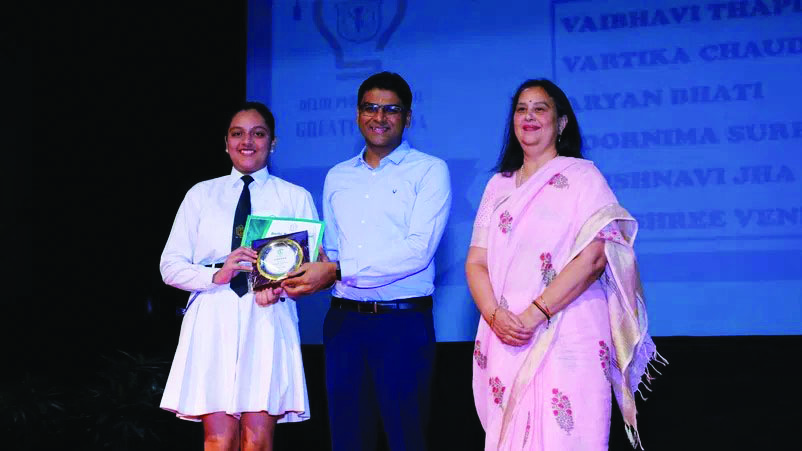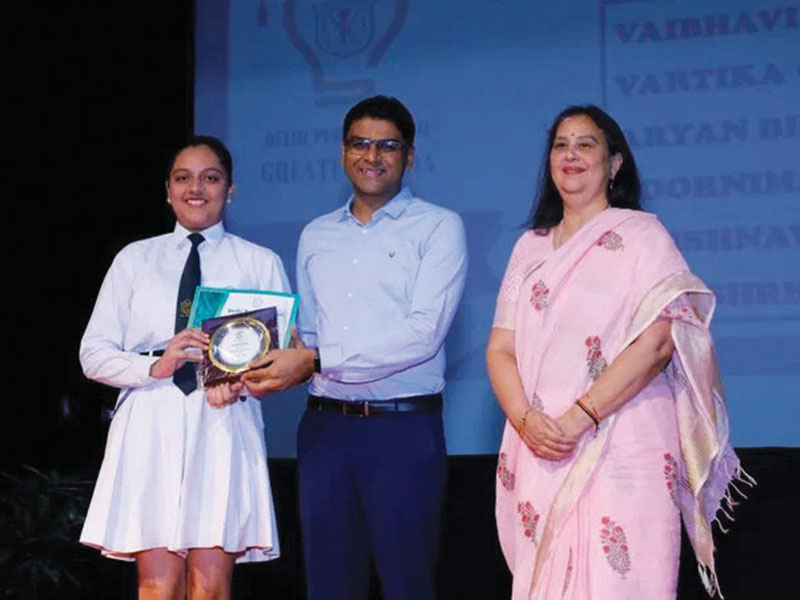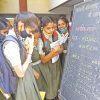Delhi: CBSE image makeover
Autar Nehru (Delhi)

CBSE secretary Himanshu Gupta (centre): slew of initiatives
Since himanshu gupta (ias), an alum of IIT-Delhi and former director of education of Delhi state under the Aam Aadmi Party government which had made school education a top priority during its two terms in office (2014-2024), was appointed Secretary of the Central Board of Secondary Education (CBSE) — India’s largest national school examination board with 30,700 high-ranked affiliated primary-secondary schools — in November 2023, he has launched a slew of initiatives to contemporise and upgrade this somnolent syllabus-setting and school-leaving exams board.
CBSE is an autonomous subsidiary of the Union education ministry but is widely perceived as being less than autonomous because it is vulnerable to the diktats of ministers and obedient bureaucrats more focused on reviving India’s ancient glories and mythology than on introducing contemporary curriculums and pedagogies in K-12 education.
Therefore, a large number of schools top-ranked in the annual EW India School Rankings (the world’s largest schools ranking survey) including Inventure Academy, Bengaluru, Cathedral & John Connon, Mumbai, Dhirubhai Ambani International, Mumbai, The Shri Ram School, Delhi and the Doon School, Dehradun have opted for affiliation with the rival pan-India CISCE (Council for Indian School Certificate Examinations) which has 3,100 affiliated schools countrywide. Although CISCE has a smaller number of schools affiliated with it, the management of this exam board, successor of the pre-independence Senior Cambridge Board, believes that its syllabus and assessment systems are qualitatively superior.
Evidently, Gupta intends to correct this perception and give CBSE an image makeover. Reportedly with strong backing from Sanjay Kumar, IAS, alum of St. Stephen’s College, Delhi and Secretary in the Union education ministry’s Department of School Education and Literacy, Gupta has rung changes in the CBSE syllabus to stimulate creativity and conceptual grasp of students instead of memorisation skills, introduced over 33 skill subjects in secondary and higher secondary classes and has signed collaboration agreements with Unesco, the British Council, IBM, Microsoft and Intel for teacher training and digital education. Other new initiatives are introduction of a comprehensive Parenting Calendar to strengthen the home-school partnership and mandating use of the mother-tongue or home language during foundational and preparatory stages of education. The latest in this reforms series is a May 16 circular to establish ‘sugar boards’ in affiliated schools to reduce the sugar consumption of children.
This circular is timely because education and health are inter-dependent. Sick and ill children can’t learn. In middle class India, sugar accounts for approximately 13 percent of daily calorie intake of children aged 4-10, and 15 percent for children aged 11-18. This far exceeds the World Health Organisation’s recommended cap of 5 percent. Proliferation of sugar snacks, beverages and processed foods, often easily available in school environments, contributes significantly to excessive sugar intake. NCPCR (National Commission for Protection of Child Rights) in recent consultative meetings with various stakeholders in K-12 education, has supported this CBSE initiative.
“Establish ‘sugar boards’ where information is displayed for educating the students about the risks of excessive sugar intake. These boards should provide essential information, including the recommended daily intake, sugar content in commonly consumed foods (unhealthy meals such as junk food, cold drinks, etc), health risks associated with high sugar consumption, and health dietary alternatives. This will educate students about informed choices and promote long-term health benefits among students. Affiliated schools have been asked to organise seminars and workshops in this regard and by July 15 submit a brief report along with photographs of these activities on https://shorturl.at/E3kKc,” says the May 16 circular.
CBSE’s child health focused initiative has been widely welcomed. Comments Rita Kapur, Director of the CBSE affiliated Gyanshree School, Noida: “This is a welcome move. In our school we have already disallowed junk food and cold drinks, and provide cooked satvik — plain & less spicy — meals to children. Schools should consider providing in-school meals to not only ensure nutrition control but also support the spirit of this initiative.”
The urgency behind CBSE’s May 16 circular is reportedly driven by a report in the Diabetes Research and Clinical Practice journal (August 2023) which says 15.35 percent of Indian schoolchildren are in pre-diabetic condition, and nearly 1 percent already have diabetes — a rare disease in the young.
Health professionals have also welcomed the CBSE circular. Says Dr. Deepmala Lalchandani, President of IMA Dwarka and Deputy Medical Superintendent at Shri Dada Dev Matri Avum Shishu Chikitsalya: “This is a huge step. But these efforts must go beyond tokenism. Sensitizing children to food labelling, nutritional profiling, and calorie calculations is critical if the message is to stay with them.”
Gupta’s initiatives to upgrade CBSE are overdue because offshore examination boards such as the Geneva-based International Baccalaureate (IB) and Cambridge International, UK have slashed affiliation fees, and with their contemporary syllabuses and new technologies-driven assessment systems are offering stiff competition to CBSE.
To this list, add the Western Australian Certificate of Education Board which has been given equivalence to IB, Cambridge, CBSE and CISCE in end-May. Simultaneously, the Delhi-based CISCE under recently appointed Secretary-General Dr. Joseph Emmanuel is also getting its act together to emerge as a rejuvenated competitor to CBSE.
Little wonder Gupta is in a hurry to shed CBSE’s neta-babu board image.
Also Read: MP: 10 schools ordered to return Rs 65 crore in illegally collected fees

















Add comment